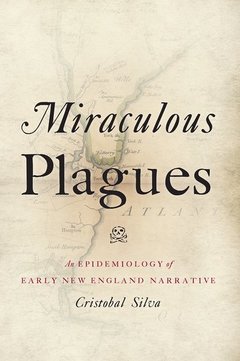Miraculous Plagues An Epidemiology of Early New England Narrative
Langue : Anglais
Auteur : Silva Cristobal

In the summer of 1629, John Winthrop described a series of epidemics that devastated Native American populations along the eastern seaboard of New England as a "miraculous plague. " Winthrop was struck by the providential nature of these epidemics, which fit neatly within the settlers' justifications for colonial expansion. Taking Winthrop's phrase as a cornerstone, Miraculous Plagues re-imagines New England's literary history by tracing seventeenth- and early eighteenth-century epidemics alongside the early migration, the Antinomian controversy, the evolution of the halfway covenant and jeremiad, and Boston's 1721 inoculation controversy. Moving beyond familiar histories of New World epidemics (often referred to as the "virgin soil " model), Miraculous Plagues identifies epidemiology as a generic category with specialized forms and conventions, and considers how regional and generational patterns of illness reposition our understanding of the relation between immunology and ideology in the formation of communal identity. Epidemiology functions as subject and method of analysis in Miraculous Plagues: it describes those narratives that represent modes of infection, population distribution, and immunity, but, more germane to the field of literary criticism, it describes a set of analytical practices for theorizing the translation of epidemic events into narrative and generic terms. Without denying epidemiology's usefulness in combating contemporary epidemics, Miraculous Plagues affirms its power to transform colonial spaces, and thus to reshape inquiries into the nature of community and identity; it offers critics new trajectories for analyzing late twentieth- and early twenty-first century epidemiology, and for rethinking illness and infection in terms of the geopolitics of medicine.
Acknowledgments. Introduction. Chapter 1: New England Epidemiology. Chapter 2: Vectors of Dissent. Chapter 3: Puritan Immunology. Chapter 4: Technologies of Inoculation. Afterword. Works Cited. Index.
Cristobal Silva is an Assistant Professor in the Department of English and Comparative Literature at Columbia University. Currently, he serves as the associate editor of the journal, The Eighteenth Century: Theory and Interpretation.
Date de parution : 05-2016
Ouvrage de 256 p.
23.1x15.5 cm
Date de parution : 08-2011
Ouvrage de 256 p.
23.6x16.3 cm
Thème de Miraculous Plagues :
© 2024 LAVOISIER S.A.S.
